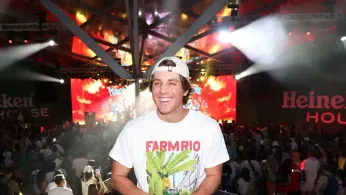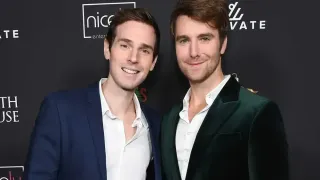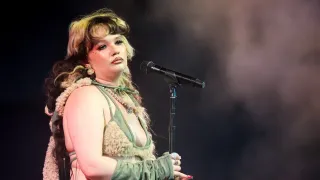
4 hours ago
'White Lotus' Star Lukas Gage Reveals Childhood Sexual Abuse by Camp Counsellor
READ TIME: 4 MIN.
Lukas Gage, celebrated for his performances in "The White Lotus," "Euphoria," and "Companion," has revealed in his debut memoir "I Wrote This for Attention" that he was sexually abused by a camp counsellor at the age of eleven. Gage, who came out as queer and has often spoken about LGBTQ+ visibility in entertainment, shared his story in a deeply personal interview with Amanda Hirsch on the "Not Skinny But Not Fat" podcast and through excerpts from his memoir .
The actor, now 30, explained that he only recognized the experience as abuse much later in life, after processing the trauma with a therapist in his twenties. “I didn’t even realise it was a thing. I think there’s a real stigma behind it, because I didn’t do anything,” Gage told Hirsch, highlighting the confusion and misplaced guilt many survivors feel .
Gage recounted how the abuse led to dissociation and a sense of shame, feelings he carried into adulthood. “I left my body. There was a feeling that I was a willing participant,” he said, describing how survivors often internalize blame . The actor did not disclose the abuse to anyone until just three years ago, a delay he attributed to both personal denial and societal stigma. “You feel there’s a participation of you, and it wasn’t until I had a therapist be like, literally had to break it down for me like in my twenties. ‘You’re in your twenties, this person was in their twenties, would you ever do anything with an 11-year-old?’ I’m like, no. No. But that was a hard part to talk about,” Gage shared .
He eventually found the strength to tell his mother, an experience he described as emotionally taxing for both of them. “I sat her down and I was like, ‘Look, I hate talking about this. I hate having this talk with you. I hate having shame about it because we shouldn’t have shame about it. I just want to warn you, there’s probably a part that’s gonna be disturbing for a mom to read, but you did nothing wrong and it wasn’t because of a lack of your parenting or anything,’” Gage recalled . In a separate interview with US Weekly, Gage added, “There was nothing she could’ve done to protect me. The world is a crazy, scary place, and you can only protect your kids so much” .
Throughout his memoir, Gage addresses his trauma with a blend of candor and humor—an approach he describes as his “favorite defense mechanism.” “I talk about the darkest stuff in my life with a laugh and then I talk about the most mundane details and I’m super serious,” he said in his podcast interview. “Talking about the molestation, I feel like we to be small when we talk about it. For me that was a way for me to gain my power back and to use a little bit of humility to gain my narrative of that story and not let it make me feel weak and small and shameful. Humour, I lean into it to feel strength” .
Gage also discussed the importance of therapy and openness with loved ones in his healing process. “Now, he says he isn’t left ‘feeling like I’m a weird freak that it happened to. It doesn’t have this weight’” .
Gage’s revelation is significant not only for its personal courage but also for its resonance within the LGBTQ+ community. LGBTQ+ individuals often face heightened vulnerability to sexual violence, compounded by stigma, fear of disbelief, and the risk of being outed or marginalized. By sharing his experience, Gage helps to break the silence that can surround abuse, encouraging other survivors—especially LGBTQ+ youth—to seek support and resist shame ; .
His story also highlights the need for greater awareness and education around child sexual abuse, particularly in settings such as camps, schools, and extracurricular programs. Advocacy organizations stress that adults must be vigilant, that children deserve safe environments, and that survivors should never be blamed for the actions of abusers .
In addition to the account of his childhood trauma, Gage’s memoir delves into other aspects of his personal journey, including a turbulent upbringing, a diagnosis of Borderline Personality Disorder, and the emotional aftermath of his brief marriage to hairstylist Chris Appleton, which ended in divorce in 2023 . The book is set for release on October 14, offering a candid portrait of an actor whose resilience and openness offer hope to others facing similar challenges.
By coming forward, Gage joins a growing movement of LGBTQ+ public figures who are challenging silence, pushing for systemic change, and advocating for survivor-centered support. As conversations about sexual violence, mental health, and LGBTQ+ rights continue to intersect, Gage’s voice adds momentum to calls for safer spaces and greater compassion—for all survivors, regardless of gender identity or sexual orientation.






